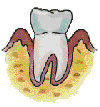Sensitive Teeth Pain • Tooth sensitivity to hot & cold
 Dentinal Hypersensitivity or simply Sensitive Teeth, is called the condition when a cold or hot, sweet or sour stimuli in the mouth
or even regular brushing or breathing cold air causes an intense pain to some teeth.
Dentinal Hypersensitivity or simply Sensitive Teeth, is called the condition when a cold or hot, sweet or sour stimuli in the mouth
or even regular brushing or breathing cold air causes an intense pain to some teeth.
Tooth sensitivity pain can have a negative effect in the patients quality of life, as the pain forces them to change their dietary habits avoiding drinking a cold refreshement or hot coffee or eating a sweet or icecream.
What causes the pain in Tooth Sensitivity ?
 Sensitive teeth pain has become one of the most common teeth problems as people keep their original teeth longer.
Gums are receding by age exposing the tooth below the gum line where dentine is covered by cementum that is much softer than the enamel of the tooth crown.
Sensitive teeth pain has become one of the most common teeth problems as people keep their original teeth longer.
Gums are receding by age exposing the tooth below the gum line where dentine is covered by cementum that is much softer than the enamel of the tooth crown.
The dentine contains a network of micro-tubules which run the full width of the dentin, from the pulp in the center of the tooth up to the outer edge below the enamel. If a tooth area loses its protective layer of the enamel or cementum, the dentine becomes exposed to the outside oral environment.
Nerve cells of the pulp extending inside these tubules can be stimulated by external heat, cold, or touch. This external stimulation is thought to produce movement of the fluids within the tubules and tension of the nerve, making the teeth sensitive to hot and cold, and causing a strong pain signal to be sent by the nerve.
Causes of Sensitive Teeth Pain
The most usual causes of a tooth sensitivity pain are :
- Exposed root areas due to receding gums or periodontal disease.
- Dentine exposure caused by vigorous brushing with a hard bristled toothbrush or incorrect way of brushing.
- Worn out enamel because of teeth grinding
- Enamel erosion caused by chemical agents or acidic diet
- Tooth decay, due to the lesions of the enamel surface
- Teeth sensitivity pain can occur following routine dental procedures like teeth cleaning, root planing or tooth restoration. These teeth sensitivity problems are temporary, usually disappearing in 4 to 6 weeks.
- Teeth whitening can lead to exposed dentine and sensitivity pain as a result of the high abrasivity or/and chemical action of the whitening products' active ingredients on the tooth tissues.
Read more about the possible teeth whitening side effects.
How to prevent Tooth Sensitivity
As preventive measures for avoiding sensitive teeth pain you should :
- Maintain good oral hygiene. Keep your gums healthy to prevent gums recession.
- Use a soft bristled toothbrush.
- Brush correctly without using excessive force. Horizontal movements of the toothbrush can cause abrasions of the enamel or cementum along the gum line.
- Avoid very acidic foods and drinks to prevent teeth erosion.
- Use a low abrasivity toothpaste. Whitening and anti-tartar toothpastes are usual causes of tooth sensitivity.
Treatment for Sensitive Teeth Pain
If you are looking for a cure for tooth sensitivity pain, try the following remedies :
- A sensitivity toothpaste, is the simplest way to fight a tooth sensitivity problem. Toothpastes for sensitive teeth contain special ingredients as strontium or potassium which are de-sensitising agents. Strontium chloride works by blocking the dentine microtubules that enable cold and heat sensations to reach the tooth's nerve and cause pain. Potassium citrate and Potassium nitrate work in a different way by blocking the mechanism of pain transmission between nerve cells.
Other sensitive teeth remedies include:
- Dentist prescribed fluoride gels or high fluoride level toothpastes, work by enhancing the enamel remineralisation, 'closing' the dentine microtubules
- Fluoride varnishes may be applied on sensitive teeth by your dentist in more severe cases of teeth sensitivity.
- Tooth bonding which works by covering the exposed surfaces with a composite material and sealing the pores of the dentine. Bonding is mainly used for cosmetic dental treatments but it can provide an effective solution for sensitivity pain problems.
- If none of these proves to be a successful sensitive teeth treatment, the last solution is a dental crown which is an indirect restoration that covers the entire visible part of the tooth with a tooth-shaped “cap” in order to replace lost tooth structure, to protect and strengthen the tooth. A dental crown may be needed if a tooth has extensive enamel loss that has exposed the dentine leading to severe tooth sensitivity pain.

 Dental Insurance
Dental Insurance Toothache Remedies
Toothache Remedies